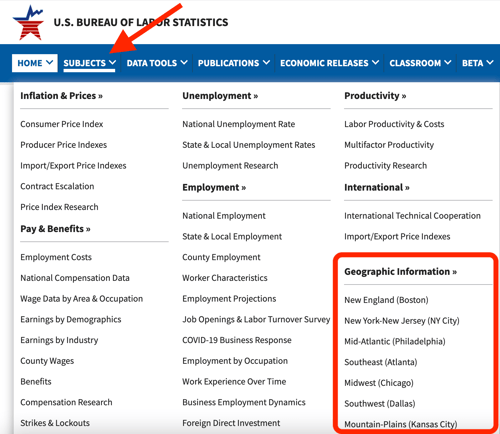Sales is a key partner and client of product marketing, but that doesn’t mean that the relationship is always peachy. Since product marketing plays more of an influencer role, finding the most productive ways to work with your sales team can require all of your persuasive power. The keys are to be inclusive, thorough, and persistent. Like any good relationship, you’ll get out what you put in.
Develop Your Sales Persona
As product marketers, we spend an enormous amount of time trying to get inside the heads of our buyers and documenting our findings. But how often do we think as deeply about sales as an audience for our “products” that face them? How well do we understand their exact pains and needs?
Take your strategy to the next level with the Ultimate Guide to Sales Enablement
Depending on your existing relationship with sales, you might already have a strong sense. Or you might be operating from the Product Marketing Ivory Tower, wondering if anyone reads your missives. In either situation, you can take a step back to identify who your different stakeholders in sales are, how their needs are distinct, and what gaps in their knowledge exist. For each team that your work with, try to identify:
-
- Functional Information:
- What their titles/positions are
- Where they sit in the Sales organization
- How they are compensated and promoted
- Needs:
- What the organizational focus is
- What the team focus is
- What typical personal drivers are
- Any conflicts between those needs
- Value Proposition:
- What you want them to see as your value
- Buying Cycle:
- How they become aware of your role
- How they learn about your value
- How they see demonstrable value from you
- Functional Information:
With a more defined sense of how you will be perceived, you can then develop a targeted plan of action to adjust how you approach your “market” of sales teams.
Establish Credibility with Sales
Salespeople spend most of their day focused on building trust, whether that’s getting the first call or moving a deal to close. Naturally then, they respect that skill in others, and you should seek opportunities to do so.
The most important relationships to build are with the sales leadership and managers, focused on shared goals of driving revenue and improving win rates in competitive deals. However, these individuals have different motives and mandates than their team members, so it is important that you develop relationships with individual sales reps too.
The temptation is to go to the top performing reps, and they very well might be the right relationships to foster. But it’s important to know how those top performers are perceived by their peers. What is the source of their success? Do they provide help to others, or are they more individualistic? Are they seen as a mentor? To get these answers, you should seek out not just managers but reps as well and compare the names; you are likely to find a more complex map of the team, and along the way, you will establish more relationships with others in your audience.
Get in Front of The Sales Team
Building a visible presence with sales – ideally a physical one – is vital to the process. As the owner of the customer relationship, you need their assistance to develop a deeper understanding of your buyers. But when participating in sales calls with prospects, be mindful that you are establishing another relationship in the room as well.
Before the call, you should go beyond just discussing the opportunity with the rep and qualify your role in the call: silent observer, introduced but backseat, independent expert, or otherwise. You should also ask for a few minutes after the call to discuss any questions you might have. This discussion period is important to understand how the rep approached the call, as well as to give you the ability to establish your bona fides with the rep. Observant questions about process and choices are great at the beginning. In time, the rep will ask for feedback, and eventually participation once you have established how you can be valuable on certain calls.
Another important opportunity to build relationships is to physically locate yourself where your sales team lives every day. If you have an inside sales team, go camp out in “the pit” once a week or schedule “office hours” when you’ll be there. It can be trickier with field teams beyond the traditional moments like Sales Kickoffs (SKOs) and Quarterly Business Reports (QBRs); however, you can make it a habit to arrange a roadshow, particularly if you have events or customer advisory meetings in the field. You will want to emphasize to management and leadership that any visit to your office by field reps is an essential opportunity to interact.
Build Trust with Sales
Since we've been trying to see the world through the eyes of sales reps, let's continue that train of thought in terms of information exchange. The transactional nature of the relationship between sales and prospect is an important lever in your own efforts as product marketer. The expectation is that for anything that you give you must get something in return.
Relocating that exchange to the product marketing-sales relationship, it is vital to give something in value before expecting something in return. Or at the very least, if you ask for something, you should be prepared to reciprocate quickly. You can even use the law of reciprocation and social relationships to your advantage; if you deliver more value than was provided to you, the debt then defaults to the salesperson, and you are justified in seeking repayment.
To put this in more practical terms, sales wants to know something that they do not already know. What they have less insight into are: 1) a broader understanding of the market and competitive moves, and 2) the breadth of experiences across the sales team. As the primary researcher on market changes, you can translate that knowledge into practical deliverables like battlecards and competitive profiles. With some additional effort looking at notes in Salesforce or other sales tools, you are likely to find some targeted insights that can help out your target evangelists and show them that you’re a valuable resource from the start. Of course, as you get more reps in your corner, you can begin to share out knowledge of what’s happening across reps and teams that provides even more value and opportunities to connect with your evangelists.
The best part of this relationship building process is that you’re building empathy along the way with sales people because you’re managing relationships just like they do everyday. You will be able to speak to them coherently and authentically about the process of relationship-building, and open up new avenues for you to help them win more deals.

Seeing is believing! Check out Crayon for yourself.
Take a Product TourRelated Blog Posts
Popular Posts
-
 The 8 Free Market Research Tools and Resources You Need to Know
The 8 Free Market Research Tools and Resources You Need to Know
-
 6 Competitive Advantage Examples From the Real World
6 Competitive Advantage Examples From the Real World
-
 How to Create a Competitive Matrix (Step-by-Step Guide With Examples + Free Templates)
How to Create a Competitive Matrix (Step-by-Step Guide With Examples + Free Templates)
-
 24 Questions to Consider for Your Next SWOT Analysis
24 Questions to Consider for Your Next SWOT Analysis
-
 How to Measure Product Launch Success: 12 KPIs You Should Be Tracking
How to Measure Product Launch Success: 12 KPIs You Should Be Tracking
